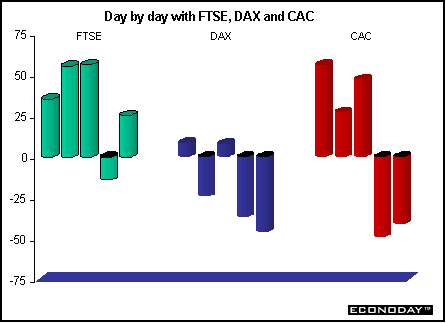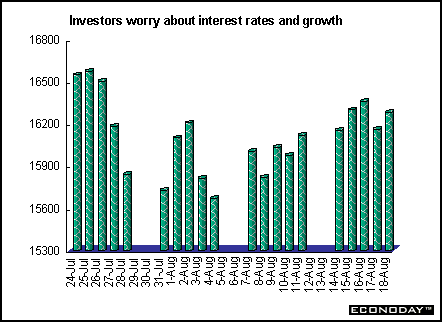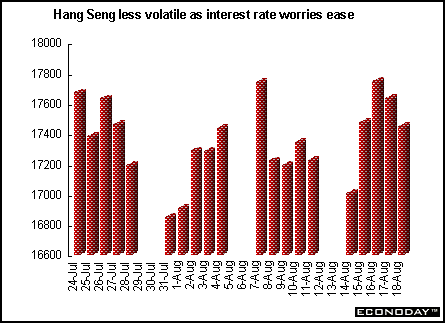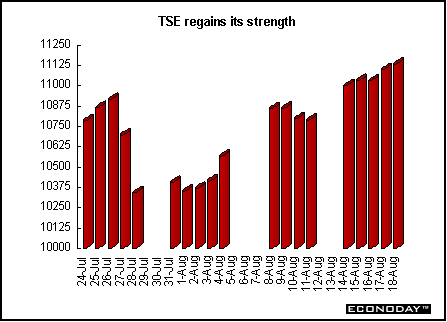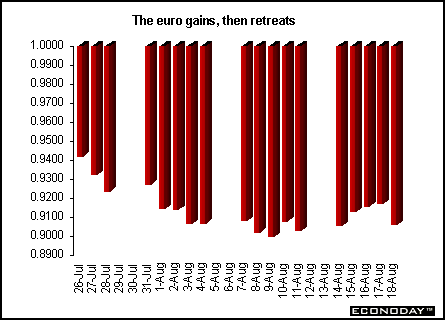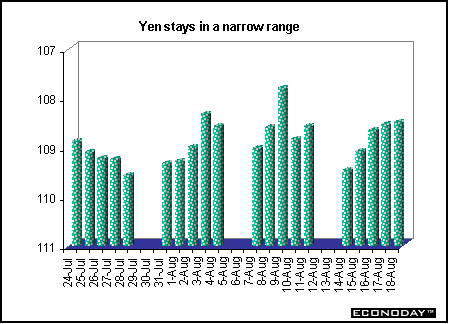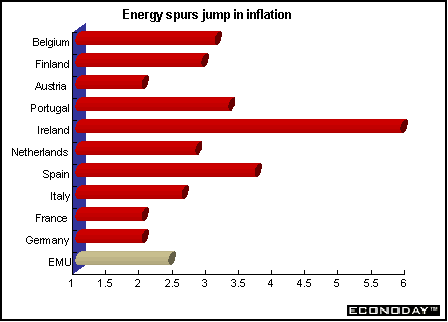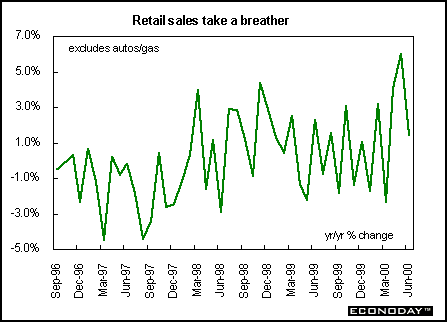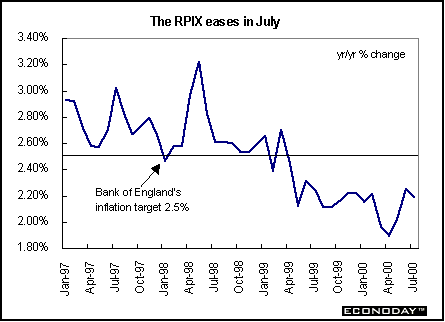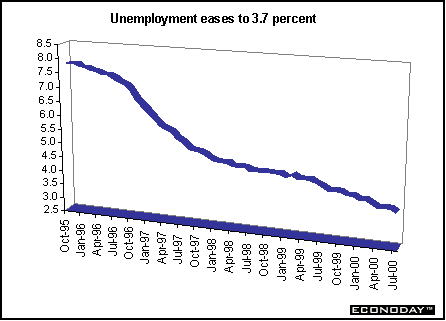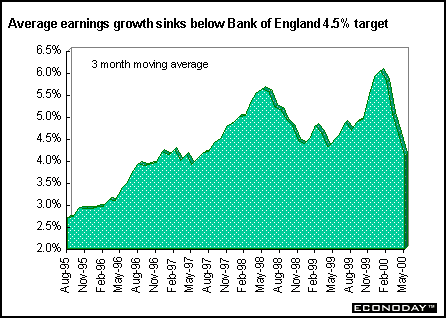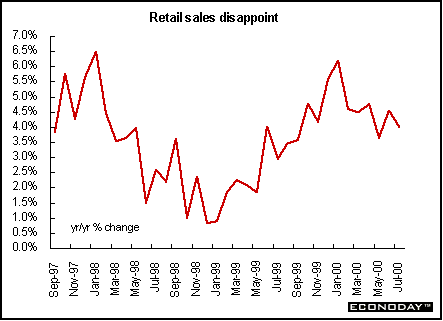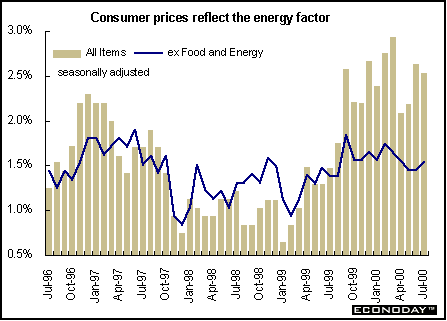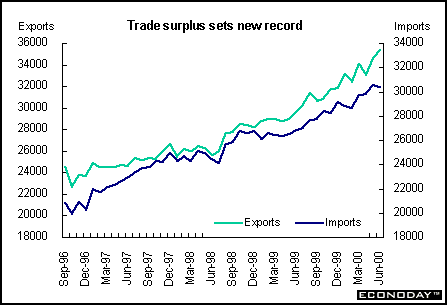| Previous Articles |
|
Markets flutter in summer breeze
Britain and Europe
The Paris CAC 40 pushed ahead on steady demand for selected technology related stocks early in the week, but turnover remained thin. Tuesday was a holiday but the stock market was open even though the rest of France took the day off. The CAC rose to a new closing high on Wednesday but eased down on Thursday and Friday on profit taking and the UMTS auction results. The CAC ended the week at 6594.35, up 41.35 points or 0.63 percent.
The Frankfurt DAX, thanks to the telecommunications sector turmoil, ended the week at 7232.42, down 90.56 points or 1.24 percent. The FTSE 100 closed on the plus side four days out of five. The FTSE ended the week at 6543.70, up 159.20 points or 2.49 percent. There were a plethora of economic data releases important to monetary policy makers. (See indicator scoreboard below.) The minutes to the August Bank of England Monetary Policy Committee meeting were released also. London markets seemed to ignore it all.
Asia But on Thursday a new reality struck investors. Japanese stocks fell on concern that the rate hike will prompt troubled borrowers to increase requests for debt relief, hurting the profits of banks and other lenders. The Nikkei 225 stock average ended the week at 16,280.49, up 162.99 points or 1.01 percent.
Hong Kong's Hang Seng index rose as investors bet that the earnings outlook for banks and developers should improve after U.S. economic data reduced the prospects of higher interest rates this year. The Hang Seng rose 225.58 points or 1.31 percent to end the week at 17,440. Hong Kong investors have decided that the U.S. Federal Reserve will not raise interest rates, and therefore Hong Kong's rates will not be raised either. With the Hong Kong dollar pegged to the U.S. dollar, interest rates generally rise in tandem.
Americas Currencies
However, the enthusiasm for higher interest rates waned on Friday and the euro slipped against the dollar and the yen on concern that an ECB interest rate increase might put the brakes on EMU economic growth. Speculation has mounted that the ECB will raise its benchmark rate, now 4.25 percent, by at least 25 basis points - and perhaps 50 basis points - at their August 31 meeting to stem accelerating inflation. An ECB rate increase would raise returns on euro denominated deposits attracting investors to money market securities. Yet it would also raise borrowing costs for companies and crimp their profits, possibly hurting the region's stocks and leading equity investors to shun the euro.
The yen stayed within a narrow range against the dollar and the euro amid concern that the end of the Bank of Japan's zero interest rate policy will cause short term dislocations, which would squelch the nascent economic recovery.
Investors' concerns were underlined by a report that June bankruptcies rose for the ninth month in a row with liabilities of bankrupt firms hitting a post war record. Bankruptcies are expected to continue to rise in the months ahead as Japan's corporate 'zombies' find their banks less willing to extend credit and the government less willing to underwrite bailouts.
Central Banks Bank of Japan's Monetary Policy Board members voted 7 to 2 to maintain zero interest rate policy at their meeting June 28, but it seemed clear that members were preparing for an increase. The board did raise rates by 25 basis points at its meeting on August 11. At the June 28 meeting, however, discussions revolved around how an increase would be perceived and whether it would be seen to be in opposition to government efforts to continue stimulating the economy. The majority agreed with the comment that "when terminating the zero interest rate policy, the bank should make clear its view of the economic outlook, checking it against the criteria for terminating the policy - the disappearance of deflationary concern." Members wanted to wait for the June tankan report (which came out in early July) "to determine whether the upturn in business fixed investment had spread to various other sectors including small non-manufacturers." The minutes indicated that some members thought the board should monitor other factors such as the state of financial markets (bond, stock and foreign exchange markets) as well as U.S. economic and financial market developments and their influence on Japan's economy.
The Bank of England's Monetary Policy Committee was split on the need for a rate increase in August. The MPC voted just 5 to 4 to keep rates on hold, increasing the odds for a rate increase in the near future. Hawks on the committee fear that falling unemployment will ultimately boost wage inflation, even though there is little sign of this so far.
The Bank of Canada revised its real GDP growth projection for this year up to a range of 4.25 to 4.75 percent, reflecting a strong first half in 2000 as well as upward revisions to output in the second half of 1999. For the second half of this year, the bank continues to expect a slowing in the pace of economic activity but to a rate that would still be above the growth of potential output. As a result, pressures in product and labor markets are still expected to emerge and to raise core inflation to about 2 percent early in 2001. In light of these developments, the bank will continue to pay close attention to the strength of aggregate demand and to a range of indicators of pressure on capacity.
The Reserve Bank of Australia signaled that it would raise interest rates again this year to slow inflation and cool an economy in its tenth year of expansion. The central bank raised its key rate a quarter point this month to 6.25 percent in an attempt to slow inflation, which has broken through the bank's inflation target band of between 2 percent and 3 percent. That was its fifth interest rate increase since November, totaling 1.5 percentage points. Inflation is at its highest in four years - rising oil and food costs pushed consumer prices up 3.2 percent in the second quarter from a year earlier.
Indicator scoreboard Germany - June real retail sales fell 1.3 percent when compared with last year primarily because of fewer working days this year. June seasonally and inflation adjusted total retail sales barely fell when compared to a year earlier. Bundesbank June real seasonally adjusted total retail sales slipped 0.2 percent when compared with last year. Retail sales excluding autos and gasoline were down 1.9 percent on the month but were up 1.4 percent when compared with last year. July wholesale prices rose 0.3 percent and 5.8 percent when compared with last year (the highest rate since May 1989). Excluding fuel prices, wholesale prices were up 3.2 percent on the year. Wholesale prices for manufactured goods - excluding petroleum products - rose 0.4 percent in July and were 3.0 percent above the year earlier level.
Britain July seasonally adjusted input prices rose 0.4 percent on the month and 11.3 percent when compared with a year earlier. Crude oil prices fell 2.6 percent but were still up 61.9 percent when compared with last year. Unadjusted input prices were down 0.2 percent on the month but up 11.3 percent on the year. Non-seasonally adjusted output prices rose 0.2 percent on the month and 2.9 percent on the year. Seasonally adjusted core output prices were unchanged on the month and were up 1.2 percent on the year.
July retail prices excluding mortgage interest payments (RPIX) fell 0.4 percent but rose 2.2 percent on the year. This is the 16th consecutive month RPIX has remained below the 2.5 percent government inflation target. The retail price index rate also fell by 0.4 percent on the month and was up 3.3 percent on the year. RPIY which excludes both mortgage interest payments and indirect taxes fell by 0.4 percent on the month and was up 1.9 percent on the year.
July unemployment rate fell to 3.7 percent from 3.8 percent in June - the lowest since November 1975. The ILO unemployment rate stood at 5.5 percent, down from 5.6 percent in the previous three months. Employment in the three months to June rose 106,000 on the previous quarter and was up 338,000 on the same period a year earlier. The employment rate is 74.6 percent, unchanged from last month. The manufacturing sector jobs in the three months to June fell by 82,000 on the year earlier period to 3.977 million.
Average earnings growth in the three months to June was 4.1 percent when compared with last year and down from the 4.6 percent increase in the previous three months. As widely expected, it pushed the headline rate of earnings growth below the Bank of England's 4.5 percent "pain threshold" for the first time since last summer, and was the lowest rate of growth since the 4.0 percent posted in July 1997. For the single month of June, average earnings rose 3.8 percent when compared with last year.
July seasonally adjusted retail sales volumes were unchanged on the month and up 4.0 percent on the year. In the three months to July, sales volumes have risen by 0.9 percent on the previous three months and are up 4.1 percent higher than on the same period a year earlier.
Asia July corporate bankruptcies jumped 21.4 percent when compared with last year to 1,617 cases, while total abandoned debt more than tripled to a record high of 4.264 trillion yen ($39.25 billion). Continued weak personal consumption and slumping public investment have led to an increase in under performing companies. The agency's data on failures is closely watched because the government doesn't supply official bankruptcy figures. The rise in the number of corporate failures was due in part to a sharp decline in bankruptcies in July 1999 following government measures to boost lending to small and medium sized enterprises. The rise in failures this year is a sign that the impact of those steps has faded.
Americas July not seasonally adjusted consumer price index rose 0.4 percent, pushed again by rising energy costs. Compared with a year earlier, July CPI was up 3.0 percent. July seasonally adjusted CPI was up 0.3 percent and 2.5 percent when compared with last year. July seasonally adjusted CPI excluding food and energy was up 0.2 percent and 1.5 percent when compared with last year.
June merchandise trade balance reached a new record of C$4.995 billion, mainly because of price fluctuations. The value of exports rose 2.3 percent and that of imports edged down 0.4 percent. Exports of energy and automotive products contributed the most to the increase. Imports fell 0.4 percent after three consecutive monthly increases, as decreases in imports of other transportation equipment more than offset increases in energy products and industrial goods. The increases in the merchandise trade balance in recent months are mostly the result of prices rather than changes in volume. Export prices were up mainly because of higher metal and energy prices, while import prices were down largely because of falling computer prices. The last record in merchandise trade balance, C$4.6 billion, was set in May 1996. Canada has increased its surplus with the United States from C$4.4 billion in May 1996 to C$7.8 billion in June 2000.
BOTTOM
LINE
Release dates are subject
to change. |
|||||||||||||||||||||||||||||||||||||||||||||||||||||||||||||||||||||||||||||||||||||||||||||||||||||||||||||||||||||||||||||||||||||||||||||||||||||||||||||||||||||||||||||||||||||||||||||||||||||||||
